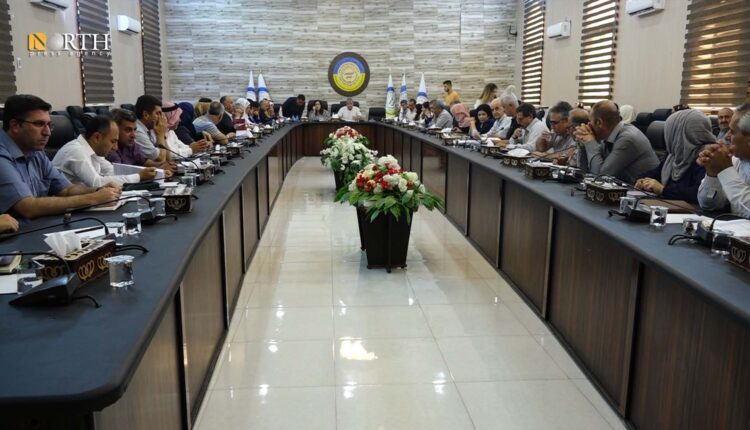AANES discusses successive crises in Syria’s Raqqa
RAQQA, Syria (North Press) – The Autonomous Administration of North and East Syria (AANES) held, on Wednesday, a coordination meeting in the city of Raqqa, northern Syria, to discuss successive crises the area is facing.
The meeting was held in the AANES building in Raqqa, with the attendance of officials of the General Council, Executive Council, and Social Justice Council.
Deputy co-chair of the General Council of AANES, Yasser Suleiman, said that the meeting would discuss the economic and social crises the areas in northeast Syria are suffering from.
This meeting is the first of its kind since AANES was established, according to Suleiman.
The AANES was first formed in 2014 in the Kurdish-majority regions of Afrin, Kobani and Jazira in northern Syria following the withdrawal of the government forces. Later, it was expanded to Manbij, Tabqa, Raqqa, Hasakah and Deir ez-Zor after the SDF defeated ISIS militarily there.
It will discuss reasons behind these repeated crises and possible solutions for them, he said.
He went further saying that the meeting would also discuss the needs of residents in AANES-held areas within the emergency response plan announced in early July.
The AANES, through its economic institutions, is working to “secure basic commodities for the population and to avoid the fuel crisis that the region is witnessing,” he noted.
He added that AANES would work in the future to prepare economic plans in line with the economic crisis conditions that “resulted from the impact of the Russian-Ukrainian war on the global economy.”
The meeting was held away from media cameras though Media department of the AANES invited agencies to attend the meeting.
Areas of the northeast Syria are facing successive economic crises that have been clearly shown in the deteriorating living and economic conditions of the population.
This comes in conjunction with closure of most border crossings with the areas of northeast Syria.
In 2014, the UN Security Council allowed aid deliveries into Syria through four border-crossings that are not under the control of Syrian government. However, under pressure of Russia and China, the Security Council reduced them to one in the beginning of 2020, which is the Bab al-Hawa border-crossing with Turkey.
Al-Ya’rubiyah (Tel Kocher) border-crossing is located on the Syrian-Iraqi border and was the most official crossing between the two countries prior to the Syrian conflict in 2011.
In July 2020, the al-Ya’rubiyah/Tel Kocher crossing was closed to UN humanitarian access to north and east Syria due to the veto of Russia and China, which exacerbated the challenges facing the region, according to civil organizations.

